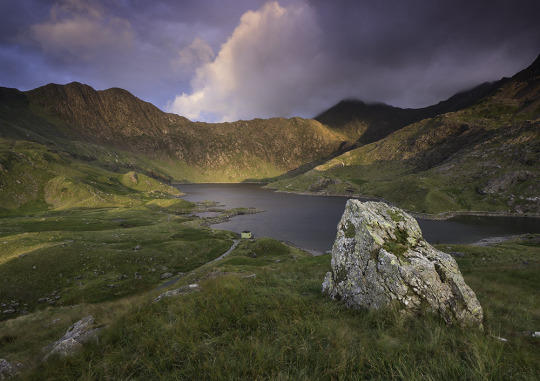#llydaw
Explore tagged Tumblr posts
Photo

Snowdonia: a shot showing the Milky Way arching over Llyn Llydaw.
Photograph: Luke Gage
Mountain Photo Of The Year Competition
#luke gage#photographer#mountain photo of the year competition#snowdonia#milky way#llyn llydaw#lake#night sky#nature
34 notes
·
View notes
Text
Y Mab Darogan 1

(Stained glass window depicting Cadwaladr and his flag in Llandaff Cathedral, Charles Powell, 1919)

(King Arthur (top left), St Tewdrig, and St Cadwaladr, stained glass window in Llandaff Cathedral. Situated in the North Aisle, Charles Powell, 1919)
'The awen predicts they will make haste;
We shall have treasures, possessions, and peace
And broader leadership and lively leaders;
And after war, dwellings in every area;
Men fierce in fight-clamour, furious warriors,
Swift in attack, slow to leave defence-
Fighters that scatter foreigners as far as Caer Wair'
- the opening first lines of Armes Prydain
Something a bit different today but I thought I'd yell about ‘Y Mab Darogan’ or The Prophesied Son, who was seen as a messianic figure in Welsh literature and was appellated to four* (!) different lads (including King Arthur). This will be a long one so please have a snack and a drink at hand. You're gonna need ‘em.
Now, Y Mab Darogan as a concept first crops up in the 10th Century poem ‘Armes Prydain’ (The Prophecy of Britain) from the Book of Taliesin. Andrew Breeze postulated that the poem was written in about ‘940 AD.’ Taliesin’s status as ‘a seer’ write Gwyneth Lewis and Rowan Williams in their introduction to The Book of Taliesin: Poems of Warfare and Praise in an Enchanted Britain means that ‘it is not at all surprising’ to find a collection of Prophetic poems alongside the others within Llyfr Taliesin. ‘Its themes,’ Lewis and Williams further write, ‘are recycled in several later poems looking forward to a reunification of the British - usually Under the leadership of Gwynedd - and the advent of a heroic deliverer.’
It's a call for all Celtic nations (Welsh, Scots, Irish, Cornish, Britons, Manx) to come to arms against the Anglo-Saxon invaders - as can be seen in the lines 'long-haired champions, masters of war/ Will come from Ireland to drive out the Saxons.', 'Both loyal men will come from Alt Clud, / A resplendent army to drive them from Britain' 'A powerful host will come from Llydaw (Brittany),' 'Let the Cymry rise up, a war-like company' and 'On all sides shame will be the Saxons destiny' and, although it doesn't feature King Arthur proper it's writing kinda alludes to his death.
To zoom through some background, Hywel Dda (yes, he of Law fame) was seen as very much toeing the line to the Angles - who y'know were (and kinda still are) Wales’ traditional enemies. Now, for ol’ Hywel, this had meant that when Edward the Elder ruled over Wessex had had to cleave to him to ensure that Wales didn't get battered within an inch of its life as had all other Celtic nations in Britain (so the Gaels, the Picts, etc, etc). However, once he was out of the picture and his son, Athelstan, had taken over, an alliance of the kingdoms of the Strathclyde*, Dublin, and Scotland had all risen against him. In a break from tradition - y'know, the whole Men of the North business where it was acknowledged and expected that the Welsh would aid their compatriots - Hywel vehemently denied the three kingdoms’ aid leading to their defeat at the Battle of Brunanburh in 937.
Obviously, this pissed A LOT of Welsh lads off.
I mean, yeah, it'd piss me off too. if I expected a battle only to find out we weren't getting one cuz some lawmaker lad had to keep his neighbours happy I'd be LIVID. So this poem was written! No word if Hywel read it, but I imagine his Goodreads review would've been a firm one star.
In it, it refers to ‘Thus they'll avenge Garmon's* friends with force/ Four hundred and forty years on' and, according to the Annales Cambriae (my absolute beloved) in 537AD there was: ‘The Strife of Camlann, in which Arthur and Medraut perished; and there was plague in Britain and Ireland.’ which means ‘404 years’ after that is 941. Therefore, the poem is very much looking forward to the annihilation of the Saxons in 941 which kinda happened because Edmund had to accept a humiliating treaty at Leicester in 941, giving the north-east of England to the Viking leader Olaf Guthfrithson.
Also, the poem invokes two famous leaders - Conan of Brittany, and Cadwaladr ap Cadwallon of Gwynedd - in the line: 'Cynan and Cadwaladr, warlords in the armies' Cadwaladr is seen as hot shit - basically on par with Arthur as a ‘Great Deliver’ figure for the Welsh - and, somehow, the Welsh Dragon has become known as Cadwaladr's flag. Cadwaladr is also important because Henry VII (yeah, HIM) claimed descent from him. The hoped-for leader is seen as returning from exile - just as Cadwaladr is said to have done and Henry VII would later do once he'd hot-footed it to France to get aid - or arriving from over the sea - as Owain Lawgoch would later unsuccessfully attempt to do in the 1300’s - and ‘on their return they … overthrow corrupt or alien rulers within Wales, and rally other Welsh kingdoms to resistance and ultimate victory over the English.’
Now, as I previously alluded to, King Arthur is pretty much absent from the early corpus which makes up the ‘Mab Darogan’ legend. The ‘fierce resentment’ of the Armes Prydain makes no mention of him, and, therefore, we must look elsewhere.
We find it in the Gwyddelian composed Historia Brittonum. He's specifically indicated as fighting the Saxons (ons of the main tenets of the job, I think we'll all agree) and doing… okay. T. Charles Edwards states, ‘The victories of a Gwrthefyr, or an Arthur, might be glorious but they had no future,’ and, I think, it is this utter glory and utter ineffectualness that highlights the two main tenets of what makes you mab darogan, well, y mab darogan.
Arthur ‘echoes the achievements of Gwrthefyr’ in his chapter and so brings with it another key building block of y mab darogan. He is an echo of what has coms before and what will - hopefully, futilely - come again. A warrior will rise and lead through Britons - the Welsh, the natives of the land - to a brief taste of freedom before slipping away in a haze.
Furthermore, T. Charles Edwards states, ‘Perhaps the main concern of the author of Historia Brittonum is to encourage the Britons to come to terms with defeat of loss and territory.’ Arthur, like Macsen Wledig before him, is a rallying point for the Welsh. A flashpoint. Arthur is the ‘British Dux’ or warlord, the rebellious leader at will bring the Saxons to heel.
The legend of him being Y Mab Darogan amongst the Welsh is thought to have taken widespread hold after this. He's seen as a rallying cry for various rebellions and poets made use of his stature to advance various other disaffected Welshmen's causes. The Anglo-Norman text ‘The Description of England’ states that ‘openly they [the Welsh] go about saying,... / that in the end, they will have it all; / by means of Arthur, they will have it back... / They will call it Britain again’ So this would firmly put him in the bracket of The Welsh Lord and Saviour, kiss fuckin kiss. Furthermore, Daniel Helbert in his essay, ‘The Prophetic Hope in Twelfth Century Britain,’ states ‘at the close of the twelfth-century, the idea that King Arthur would return from the grave and lead his people to victory was not a new one,’ for the power and popularity of this legend both within Britain and on the continent as a whole (i.e. in Brittany where Arthur - and, later, Owain Lawgoch - is also seen as a somewhat Messianic figure in his own right) had an ‘allure’ to it. This suggests that, to me, the ‘Breton/Briton Hope’ was always a powerful sticking point in people's heads. Arthur had already left an indelible mark on culture, be it Welsh, Anglo-Norman, or otherwise, and people would use it in whatever ways suited them.
But I also must caution against believing this outright. *sigh* Arthur is Welsh*, yes. The building blocks of his myth are Welsh. I do not dispute that. However, O.J. Padel says that no contemporary Welsh source of a prophecy concerning Arthur's return to Britain has been found, and Charles T. Edwards further states: ‘Although the use of a Welsh battle-poem has been suspected, perhaps rightly no such source is likely … And if there was such a poem celebrating Arthur's battles, its date remains entirely uncertain.’ While there exists plenty of poetry on Arthur's ‘descendants’ as it were, Owain Lawgoch and Owain Glyndŵr, there is nothing particularly concrete for Artie and, furthermore, we must both rely on non-Welsh texts AND Henry VII's propaganda during the Wars of the Roses when he was challenging the Plantagenets for the English throne.
(Personally, Arthur just likes to be a tricksy bastard and I wish he'd CEASE AND DESIST. Bro, I went to ur fuckin Grotto in Corwen* when I was a kid. You OWE me.)
Conversely, Arthur has been used to legitimise the English’s rule over the native Britons. Edward I, after his conquest of Wales, used ‘Round Tables’ to celebrate and justify his conquest of Wales - one of many Big Kicks in the Teeth for us, ngl, other than letting the Prince of Wales be a baby because he only babbled*, and having the true last Princess of Wales, Gwenllian, be shut up in a monastery when she was a baby - and the consequent ‘reunification’ of Arthurian Britain. The Galfridian texts also were even used to justify Edward's claim over the Scottish throne - after the House of Dunkeld came to an untimely end with Margaret, the Maid of Norway's, death at sea when she was only 7 - as Arthur conquered Scotland. Geoffrey of Monmouth, I'm hitting your ghost over the head with a boot. One with iron toe caps. And smeared in dung. Arthur's use as a colonial tool by both the Normans’ and the Plantagenet dynasty cannot be overstated. To do so is a great disservice that doesn't do anybody - least of all the Celtic countries who had their great mythological king beaten into this oppressive tool to try and bring them to heel - any favours.
Aled Llion Jones writes in Darogan: Prophecy, Lament, and Absent Heroes in Medieval Literature that the imagined victory of y mab darogan represents a ‘return to a united, unified legendary state of organicism’ which was once conjured in a long-lost son called ‘Unbennaeth Prydain or ‘The Sovereignty of Britain. Furthermore, Brud and Brut (that's Prophecy and History for all you non-Welsh speakers out there) were near-homonyms in medieval Welsh and the Brut y Brenhinedd - ‘Chronicles of the King's,’ which are an adaptation of Geoffrey of Monmouth's Historia Regum Britanniae - was framed as being the story of how British lordship over Ynys Prydain had been gained, flourished, and lost to the Saxons. Prophecy, therefore, provided how it would ultimately be won back by those who would come after Arthur.
But, I mean, Wales would have to wait to find out who their next Mab Darogan would be. Next week: Owain Lawgoch's Hot Shit Tour of France: How he Became Y Mab Darogan, Fucked About in Guernsey and Got Assassinated When He Was Cutting His Hair.
Some notes!
*Garmon is St. Garmon the Gaulish Bishop who visited Britain in the first half of the fifth century
*You could make the case that Owain Gwynedd could be seen as Y Mab Darogan considering his various run-ins with the Normans. However, you could say that about The Lord Rhys also and, if we’re getting into the meat of it, neither of those two lads are even seen as having faulty alarm clocks. Or chillaxing beneath a mountain.
*Strathclyde wasn't incorporated into Scotland until the 11th Century when it was annexed into the Kingdom of Alba. It would still be known as Ystrad Clud at this time.)
*Technically, Brythonic which is the forerunner to the Britons but, like, the language of the texts he is primarily featured in is Old Welsh. I know he's seen as an English figure but that's wrapped up on years and years of colonialism.
*That baby was later known as King Edward II whose reign was less than impressive, but extremely gay. Nice to see him committing to the Remarkable cosplay ngl. (Idk if he ever did that. I just think it's fun to imagine he did. Bet he was Lance.)
*The Grotto was so fuckin fun. If I can dredge up a photo of the Red and White Dragon fighting then I'll fuckin slap it up because ooooh, baby, it was SO COOL. Also, they had an animatronic Arthur asleep under a mountain. ANYWAY.
*Myrddin/Merlin was also associated with prophecy in the early Welsh texts particularly those about the mab darogan.
Background Reading and Sources:
Land of My Father's by Gwynfor Evans
The History of Wales by J. Graham Jones
Wales: England's Colony? by Martin Johnes (A Banger.)
The Book of Taliesin by Gwyneth Lewis and Rowan Williams
The Arthur of the Welsh by Rachel Bromwich (T. Charles Edwards is included in it. Strongly recommend it.)
The Earliest Welsh Poems by Joseph Clancy
Arthur in Medieval Welsh Literature by O. J Padel
The Welsh Triads by Rachel Bromwich
Lastly a quick aside: this is my theory but it is entirely possible that Arthur disinterring Bendigeidfran's head in Branch 2 of the Mabinogi could be seen as him taking up the 'heroic deliverer' role from an earlier Celtic hero. Certainly, while his head remained buried at Gwynfryn (White Hill, speculated to be Tower Hill in London) 'no oppression would ever come from across the sea to this island while that head was in its hiding place.' Bendigeidfran, like Arthur, was seen as the High King of Britain, and there is certainly an echo of Arthur about him. Arthur, in a fit of hubris, disclosed the head of Bendigeidfran from its resting place because 'it did not seem right to him that this Island should be defended by the strength of anyone, but his own.' And this 'was known as one of the Three Unfortunate disclosures,' so the Mabinogion says.
I'm not an academic but it is perhaps something to think about.
#arthuriana#welsh mythology#arthurian legend#the mabinogion#mabinogion#welsh myth#y mabinogi#arthurian mythology#arthurian legends#king arthur#taliesin#welsh history#welsh poetry#celtic mythology#y mab darogan#celtic myth#arthurian literature#arthurian#cymru#wales#cadwaladr ap cadwallon#welsh stuff
88 notes
·
View notes
Text
The Fire Pokémon Club (Wattpad | Ao3)
“Does she even have the power to call a meeting? I mean, she’s only a state.” Celtic League asked her father as they walked towards the meeting room that they and two others had been called into by Hawaiʻi.
“But she is a former country, Yr Undeb Geltaidd, just like Llydaw and Cernyw, and they can call meetings.”
“Yeah, but only for organizations they are a part of.” Celtic League protested
“Sometimes I forget how young you are, and then you say things like that,” Wales commented, causing their daughter to give them a fondly exasperated look.
“Do I want to know what they did?” She asked.
“No. No, you do not.” Wales responded, “Besides, you are an organization made up of former colonies, intending to preserve our cultures and languages, which almost died out. You, of all people, should be more sympathetic to Hawaii. Her native peoples have suffered similar plights to my own and the other Celtics.”
“So I’ve heard…” Celtic League muttered.
“Oh, come on, my beloved nizez. You know that Iwerzhon just has a lot of friends.” Brittany, another country invited, said as she practically skipped to join the duo.
“And kids,” Wales muttered.
“And kids, and besides, he’s a storyteller at heart. Of course, he is constantly talking about them.” Brittany added. Celtic League huffed.
“I know, I know. I don’t need a lecture,” she said as she approached the room's door, nearly shoving it open. Wales and Brittany exchanged looks with a small smile before they followed her in.
Inside the room, they saw two other nations, the American State and Former Kingdom of Hawaiʻi, the person who invited them there, and the Republic of Malta, who waved as they entered, looking relieved to see them.
“Hello, Wales,” Malta said, as he was the only one in the group she was familiar with.
“Heya Malta. How are you?” Wales responded with the friendliest smile he could muster.
“I’m confused as to why I’m here, if I’m being honest,” Malta said, turning to Hawaiʻi.
“I would also like an explanation, Hawaii,” Celtic League said. Hawaiʻi smiled as she spread out her arms.
“I have invited you all here for a very special reason—”
“Murdering my brother?” Celtic League asked, causing her father to shoot her a glare as she brought up information he and England had been trying to bury for a long time. Hawaiʻi shook her head.
“Unfortunately, no, I’ve been banned from causing international diplomatic incidents for the next three years after that trouble in Paris,” Hawaiʻi said with a dramatic sign.
“Oh, come on, that was funny,” Wales said with a laugh as he remembered exactly what Hawaiʻi was talking about.
“And you can’t say Bro-C'hall didn’t deserve it,” Brittany added.
“Oh, I agree there. Unfortunately, America can’t let me get away with things like that, and his government was very insistent he punish me because apparently ‘international diplomatic incidents are bad’ or whatever,” Hawaiʻi said, making air quotes as she explained.
“So what was the punishment?” Brittany asked, her voice playful.
“He said some of the tourists from the mainland were punishment enough and then passed out for twelve hours,” Hawaiʻi said, prompting a startled laugh out of Wales.
“Is that normal for him?” Malta asked, still looking uncomfortable.
“Yep. He’s a workaholic insomniac sometimes.” Hawaiʻi said before clapping her hands together, “Anyways, let’s get back on track. So, the reason why I’ve invited you all here is because it’s come to my attention, via Massachusetts bitching to me at three am, that we all have the ability to create fire.”
“I see where this is going, and I’m excited,” Celtic League said with a wide grin.
“Yr Undeb Geltaidd, shouldn’t you be the one advocating against arson most?” Wales asked his daughter. Celtic League snorted and waved her hand dismissively.
“You’ve let me spend too much time with Moereb Breizh. I’ve been corrupted, and there’s nothing you can do to stop it,” she said, causing Brittany to give Wales a triumphant grin.
“I wasn’t advocating arson—”
“Who are you, and what have you done with Hawaii?” Wales asked, earning him the middle finger from said state.
“But I was going to propose, like, a club for us with fire abilities so we can just fuck around with them. We are all fireproof, right?” Hawaiʻi asked, looking around the small group of nations.
“I’m not.” Malta said, “The horse features canceled it out.”
“Malta, you can hold the fire extinguisher then,” Brittany said, walking over to the fire extinguisher in the wall.
“Don’t steal that,” Wales said halfheartedly.
“Don’t tell me what to do, Kembre.” She snapped back but backed away from the fire extinguisher anyway.
“Where would we do this anyway? Because all of us together seems like a massive fire hazard.” Malta cut in.
“Fire hazards are fun.” Wales said blankly, causing his daughter to smack his head, “Ow!”
“No!” She snapped, “I’m not dealing with that bullshit from you today.”
“It was one time!” Wales protested, rubbing at his head.
“You burnt down my fucking house!” Celtic League said, throwing her hands in the air.
“I didn’t know you had a gas fireplace like a heathen!”
“Rydych chi wedi marw i mi.” (You’re dead to me,) Celtic League said, causing Wales to gasp and clutch at their chest like an overdramatic Victorian maiden.
“Dy dad dy hun?” (Your own father?)
“Fe wnaethoch chi losgi fy nhŷ i lawr!” (You burned down my house!) Celtic League yelled.
“Not that this isn’t exciting or whatever, but can you save your little familial spat for later?” Brittany asked.
“You’re literally my aunt,” Celtic League said, turning to Britanny, which caused Hawaiʻi to laugh.
“What?” Brittany asked, looking towards Hawaiʻi, who just waved her hand dismissively.
“Don’t worry about it. You just remind me of my family.” Hawaiʻi explained.
“I can’t tell if that’s a compliment or an insult,” Britanny commented. Hawaiʻi shrugged.
“Neither can I. Anyways, are you guys down for it? I…I miss being able to interact with people outside of my families.” Hawaiʻi.
“Sounds fun. And maybe I’ll get yelled at less for setting things on fire.” Wales said, causing his daughter to give him an exasperated look.
“I’m only looking because someone has to supervise all of you.” Celtic League commented.
“I thought we decided that Malta’s job was to do that. Also, you are a literal child,” Brittany said.
“And yet I’m more mature.”
“That’s because you haven’t been relentlessly traumatized yet. Give it time.”
“Fuck you.”
“You know what, maybe burning down your house wasn’t an accident.”
“TAD I WILL FUCKING KILL YOU!”
#countryhumans#statehumans#oneshots by weird#statehumans hawaii#countryhumans wales#countryhumans brittany#countryhumans malta#countryhumans celtic league
6 notes
·
View notes
Text
if you've been with me a long time on this wild and wacky journey with marg, you know two things i've had a hard time with are 1) nailing down a location for her story and 2) nailing down a time period for her story. the 2015 cinderella takes place in a very cgi land and seems to not be france, since ella's dad teaches her some french, but it also definitely isn't england since there's no overt british monarchy, etc. in terms of time period, things are nebulous. all that's fine; i wish it were more stylistically coherent, but it's a fairy tale. that said, for me as an rper who is trying to tell an internally consistent story, it's a struggle.
i've decided i'm just going to invent a country. for that reason i am pretending that there is a small country across the english channel, between brittany and normandy, called llydaw. (this is actually the welsh name for brittany, but i've decided that given the cultural commonalities all the breton regions are likely to share and the slippages in territorial bounds that would have occurred over time... it's fine. it can be llydaw.) i think that the geography of the area, which is hilly to mountainous, lots of cliffs, lots of water, corresponds really nicely to the cgi land we glimpse in the movie. the history of roman occupation in the area also helps with certain architectural elements.




one thing about the movie is that although it can't really be set in england, i find that the movie pulls a lot of images from historical british culture. specifically i think that the balcony ella and kit wave to the crowds from after their wedding/coronation is meant to evoke buckingham palace; i also think that there are other moments in the movie that are deliberately evocative of regency and victorian english tropes (the dressing scene w/ ella and lady tremaine, the "black umbrellas" deleted scene, etc). something else a friend from way back once pointed out is the accents in the movie; english accents are usually used to signify old-timiness in american movies, but cate blanchett evidently made a deliberate choice to use an accent that wasn't actually as upper-crust, or even pretend upper-crust, as it could have been, using the accent to hint at the character's background. that suggests that the elements of "englishness" in the story had utility and meaning, rather than just being used for convenience.
for these reason, setting the story near normandy, with its history with great britain, makes sense to me. historically, i am imagining that llydaw was a part of the norman and subsequently english holdings across the channel and that it held on very stubbornly as a military and then a cultural outpost even after france captured norman lands. its royal family maintains strong relations with the british royal family and it considers itself culturally closer to great britain than to france. typically in modern aus, i set margarethe's story in whatever place makes sense when writing with my partner (usually the UK or US), but if we were ever to write in a modern llydaw, i imagine it as an independent and very wealthy microstate not unlike monaco.
5 notes
·
View notes
Text
Deep dives into folklore: Arthurian legends pt 2
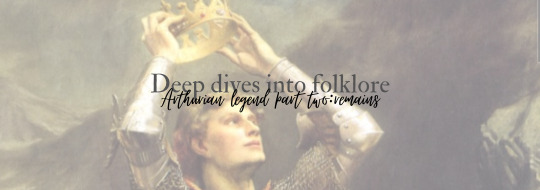
The Arthurian legends have captivated imaginations for centuries, weaving a tapestry of chivalry, romance, and heroic quests. While King Arthur himself remains a figure shrouded in myth and mystery, many of the stories associated with him are said to have their roots in the rugged landscapes of Wales. In the second part of this deep dive, we'll embark on a journey to explore modern-day locations in Wales that are believed to be the basis for some of the most enduring tales of King Arthur and his knights.
Tintagel Castle, Cornwall and Dinas Emrys, Gwynedd
Our exploration begins with Tintagel Castle in Cornwall and Dinas Emrys in Gwynedd, both of which are associated with Arthurian legends. Tintagel Castle, perched dramatically on the Cornish coast, is believed by some to be the birthplace of King Arthur. While this claim remains unverified, the castle's dramatic setting and historical significance make it a must-visit for Arthurian enthusiasts. (or at least those with the patience to walk up and down a lot of stairs, trust me, ive been there)
In contrast, Dinas Emrys, a hill fort in Snowdonia, is connected to Arthurian lore through the legend of the red and white dragons. According to the legend, the future King Vortigern sought to build a fortress at Dinas Emrys, but his efforts were thwarted by the discovery of two battling dragons—one white and one red. A young Merlin, believed to have been a wizard and advisor to King Arthur, interpreted this as a prophecy of the conflict between the Britons (represented by the red dragon) and the Saxons (represented by the white dragon).
Caerleon, Newport
Caerleon, a picturesque town near Newport, is often identified with the ancient city of Camelot. In Arthurian legends, Camelot was the legendary court of King Arthur and the Knights of the Round Table. While there is no concrete historical evidence linking Caerleon to Camelot, the town's Roman ruins, including an impressive amphitheater and fortress, add to its mystique. Visitors can explore the remains of Isca Augusta and imagine the grandeur of Arthur's court.
Arthur's Stone, Gower Peninsula
On the stunning Gower Peninsula in South Wales, you'll find Arthur's Stone, a Neolithic burial chamber also known as Maen Ceti. Legend has it that this massive stone was thrown onto the peninsula by King Arthur himself. While this may be a whimsical embellishment, the site's ancient history and striking location overlooking the landscape make it a captivating place to visit.
Llyn Llydaw, Snowdonia
Llyn Llydaw, a serene glacial lake nestled beneath the towering peaks of Snowdonia, is associated with the Lady of the Lake—a character often featured in Arthurian legends. According to the tales, it was here that the Lady of the Lake gave King Arthur the legendary sword Excalibur. While this might be more legend than history, the lake's tranquil beauty and the surrounding wilderness offer a sense of the mystical that resonates with Arthurian themes.
Glastonbury Tor, Somerset
Although not in Wales, Glastonbury Tor in Somerset, England, is closely connected to Arthurian legends and deserves a mention. The Tor is said to be the location of the mythical Avalon, where King Arthur's body was laid to rest after his death. Many believe that the Tor's enigmatic terraces and the nearby Chalice Well Gardens are steeped in the Arthurian legacy, making it a significant pilgrimage site for enthusiasts of the legends.
Conclusion
The modern-day locations in Wales, along with some neighboring areas, offer a rich tapestry of settings and landmarks that have become deeply ingrained in the Arthurian legends. While the historical accuracy of these associations may remain elusive, the charm of these places is undeniable. Whether you're a fervent Arthurian scholar or a casual admirer of legends, exploring these sites provides a tangible connection to the enduring stories of King Arthur and his knights, enriching our understanding of this captivating chapter in Welsh and British folklore.
Taglist (reply or reblog to be added):
@axl-ul @crow-flower @thoughts-fromthevoid @alderwoodbooks @harleyacoincidence @tuberosumtater @sonic-spade @theonlygardenia @holymzogynybatman @nulliel-tres
#writeblr#writers of tumblr#bookish#writing#booklr#fantasy books#creative writing#book blog#ya fantasy books#ya books#deep dives into folklore#merlin bbc#bbc merlin#folklore#books#literature#merlin#king arthur#merlin emrys#arthur pendragon#guinevere#morgana pendragon#gaius
10 notes
·
View notes
Text

Llyn Llydaw
0 notes
Text

Dawn Reflections' - Llyn Llydaw - Snowdonia
0 notes
Text
Wales is believable; there are few places associated with Guinevere and her dad in oral tradition.
I draw the line at Brittany though. That's even more unlikely than Cornwall. Brittany places Cameliard dabsmack around Hoel/Emyr Llydaw and the kingdoms of Benoic & Gaunnes while also being very near Claudas' Land Laid Waste as well as Duke Frollo. Ryon's invasion would become a logistical and chronological nightmare for the writer.
It doesn't make sense narrative wise either - Arthur doesn't cross the sea since Cameliard is said to border Logres (England) whilst Ban and Bors were worried about leaving their kingdoms vulnerable while they were gone. This wouldnt makes sense if they were next-door neighbors to Leodegrance.
Cameliard in Scotland?

(Source: Poetical Works of Alfred Tennyson, Volume 4)
I've noticed a minor recurring idea in some (modern) works, that Cameliard - the home kingdom of Guinevere and Leodegrance - is reckoned to be located in Scotland.
This is interesting to me because depending where in "Scotland" Cameliard is located, it may potentially square with the few geographical details we know of about Cameliard, mostly from the French Vulgate Cycle that introduced it. And, in turn, may lead to some very hilarious implications.
What I'm curious about though is from where did this idea came about and what's the earliest source this concept was proposed. Is Tennyson the earliest this comes up? Or did this Scotland theory originate elsewhere?
*On a different note, other sources, like Wikipedia, claim Cameliard had to be in Cornwall or associated with Cornwall in some way. This is rather incredibly unlikely as the location is already rather "crowded" within Arthurian canon, what with the Tristan story, Gorlois, its close proximity to Brittany and the Kingdom of Dumnonia. Moreover, the claim seems to be derived from the association Guinevere has with Cador of Cornwall who, in Geoffrey's chronicle, was merely her tutor and guardian. More believable are the Oral sources for Guinevere's home, which point to an area in Wales, but that's another topic for discussion.
#cameliard#arthurian geography#queen guinevere#leodegrance#modern arthuriana#vulgate cycle#scotland#britrany#carmelide#arthuriana#arthurian legends#king bans#king bors#benoic
8 notes
·
View notes
Text
Cylchdaith Llydewig

Dros fryniau a thrwy afon. . .i lawr i Aberplym â ni!
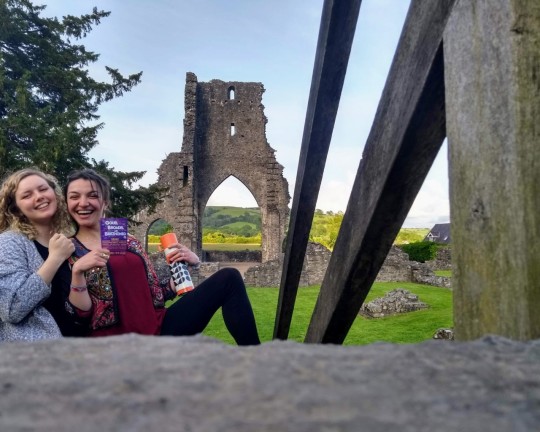
Sychu dillad ar y trên . . .
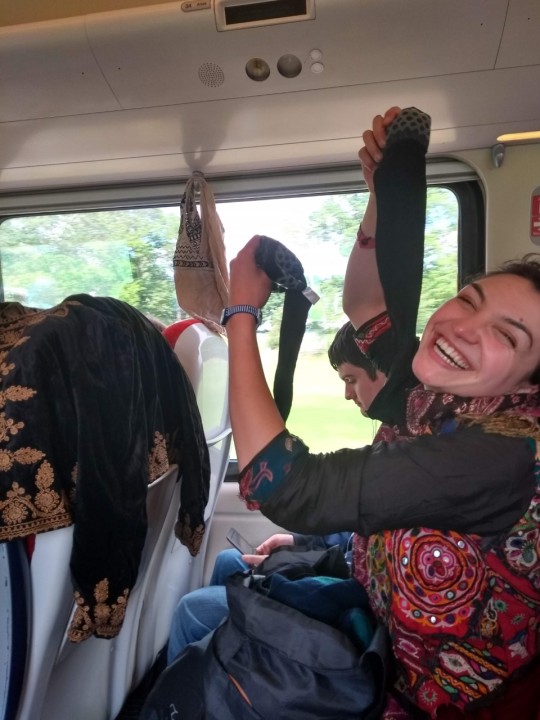


Tŷ Tom a Riwannon yn Gwerleskin.

Gouel Broadel ar Brezhoneg - Lleuwen
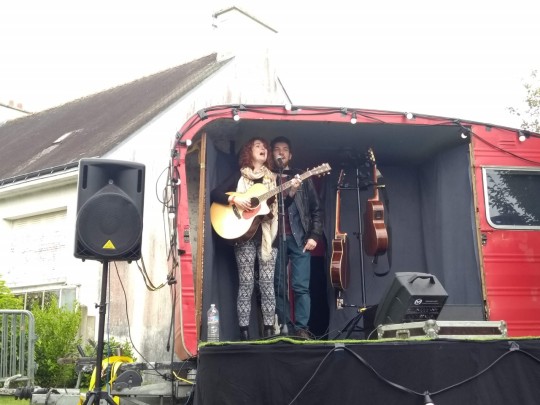
Fy nghelf ‘etcho’
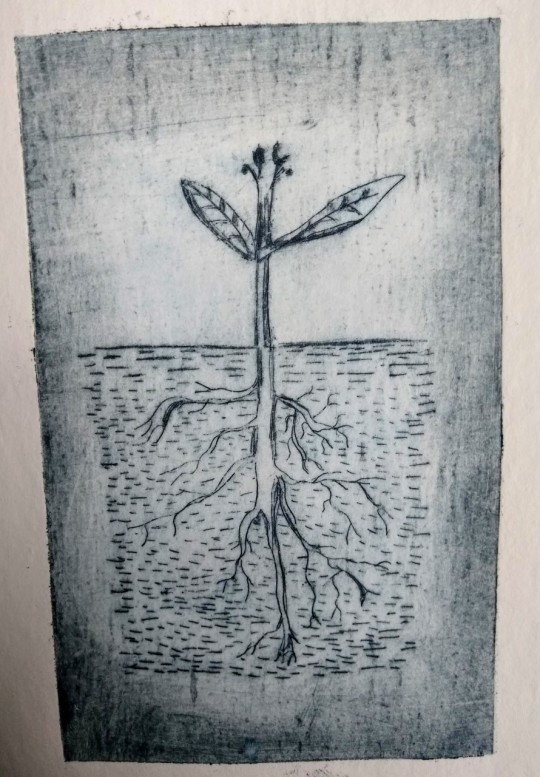
Uhelgoat (Uchel Goed) ar ôl GBB.
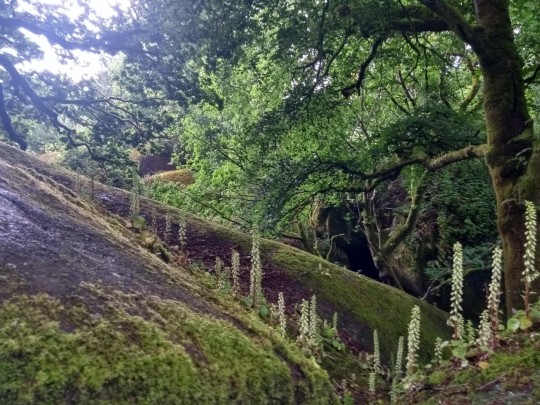
Loguny Plougris, tŷ Tad Keuz
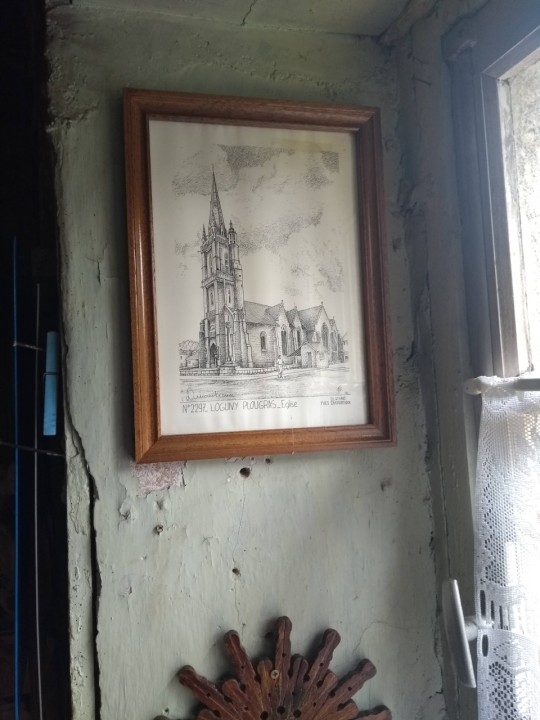
Medal i bobl a oedd yn cael llawer o blant gan wladwriaeth Ffrainc!


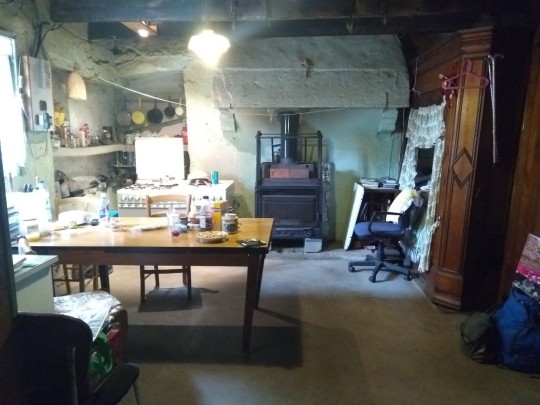

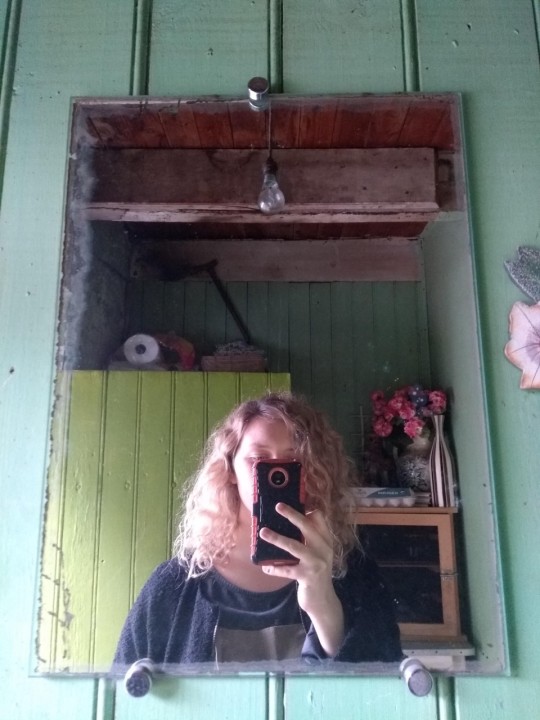

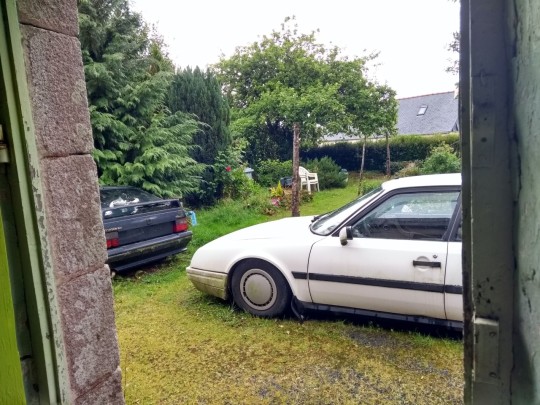
Marchnad Plouared

Konk-Kerne i Kemper
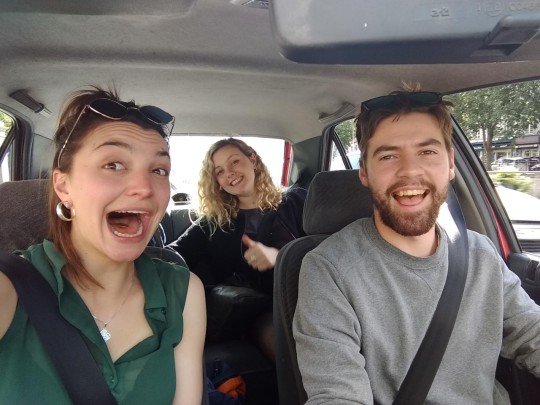
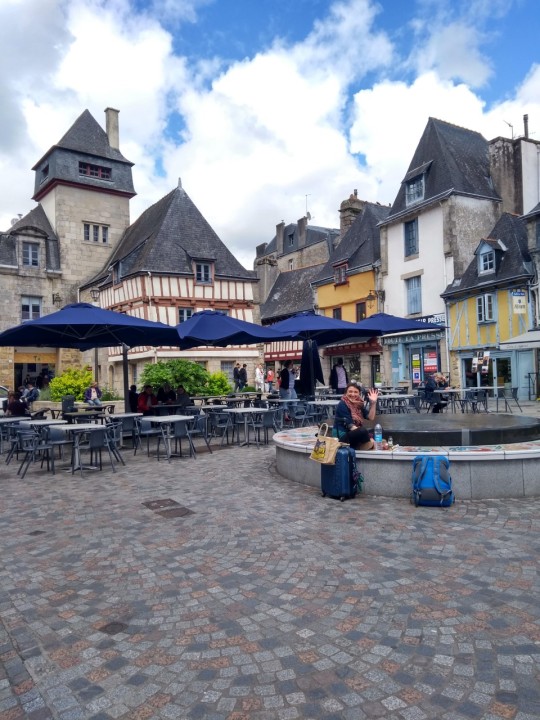


Bodio hi i Douarnenez
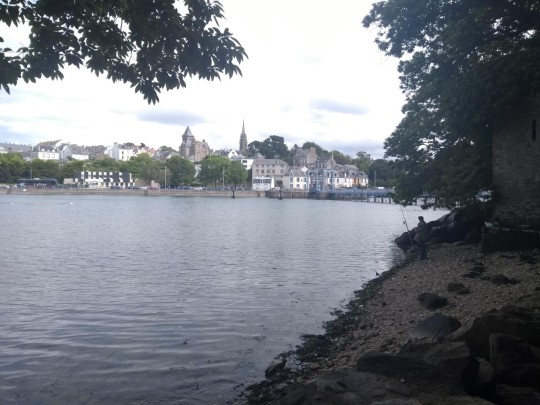
Fuon ni’n ceufadu ac yn nofio a bwyta moules yma!
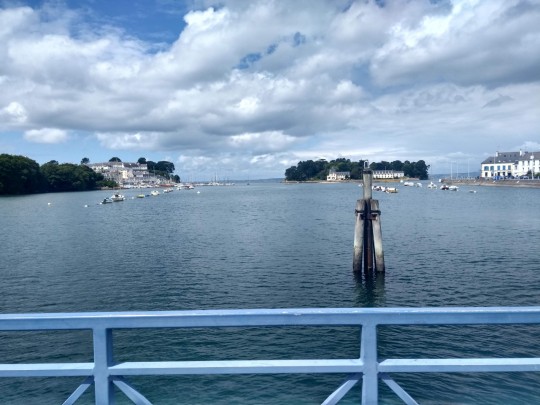
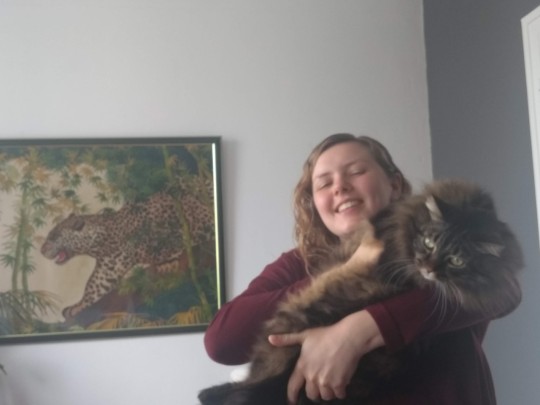

Cysgu yng nghanolfan gelfyddydau Brest.

3 notes
·
View notes
Text
Locronan
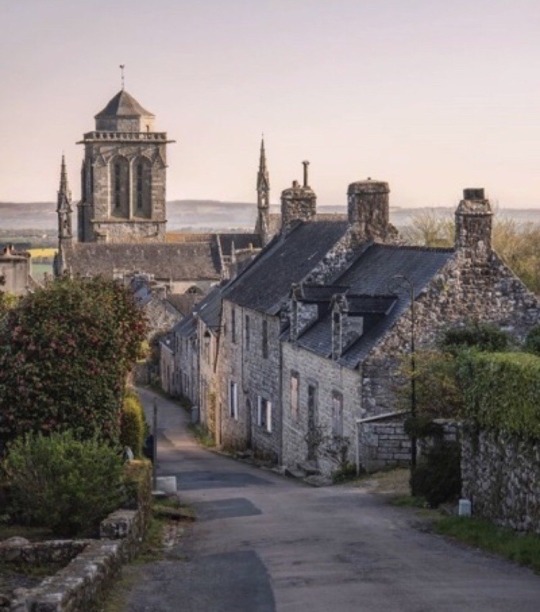
Pentref bach hudolus, cyniweiriol a chwbl ddiollwng. Yn ei gyfnodau tawel yn ystod misoedd y gaeaf nid oes iddo boblogaeth o lawer mwy nag wythgant er bod dwbl drebal na hynny yn heidio iddo yn yr haf. Daw Loc- o’r Lladin Locus; yn ôl pob tebyg am ‘fan cysegredig’; yn yr achos hwn, man cysegredig Ronan, y sant o Wyddel o’r seithfed ganrif y gorffwys ei weddillion yn Eglwys Le Pénity gerllaw.
Bu’r pentref yn enwog am gynhyrchu lliain hwyliau; heddiw, mae’n fwy adnabyddus am ei ŵyl mabsant, y Grande Troménie a’r orymdaith hir a gynhelir yno’n selog bob chwe blynedd. Lluestwyd y noson honno yng ngwesty Le Prieuré, er nad cyfleusterau moel a hunanymwadol yr asgetig oedd yn ein hanes yn y priordy hwnnw eithr moethusrwydd cymharol y gwesty serenog.
1 note
·
View note
Photo
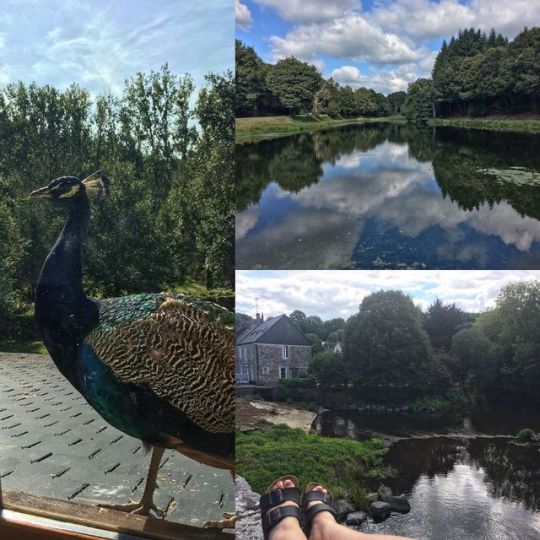
France2019 hols > day one - met a new friend at the gite, then relaxing around Pontivy and Carhaix-Plouguer #france #brittany #blavet #llydaw 🇫🇷 (at Pontivy) https://www.instagram.com/p/B2J0cLHpjp3/?igshid=t9rxxn38vv
2 notes
·
View notes
Text
the lakes Dozmary Pool and The Loe in Cornwall, the lakes Llyn Llydaw and Llyn Ogwen in Snowdonia, River Brue's area of Pomparles Bridge in Somerset, and the lake Loch Arthur in Scotland.*
So based on a cursory Google search the proposed locations for Lake Lady's Lake are in Cornwall, Snowdonia, Somerset, and Loch Arthur in Scotland.
Based on that last one (because I said so) Morgan as Vivianne/Nimue would have a Scottish accent. So by extension Lancelot has a Scottish Accent.
*copied from lady of the Lake wikipedia page
But what y’all don’t realize about accurate Fate Character Accents is that if it happened, that would mean Lancelot has a French accent.
93 notes
·
View notes
Text
Nouveautés Tartamudo reportées
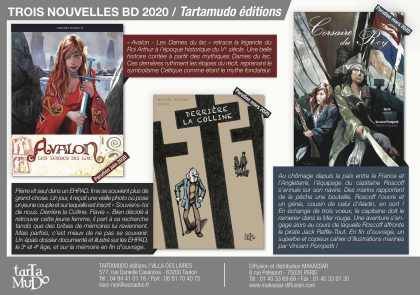
Le nouvelle édition revue et augmentée qui devait sortir en avril a été décalée à cause du confinement…Pas de date annoncée pour le moment !
View On WordPress
#aquarelle#article#Avalon#ブルターニュ#Bande dessinée#bd#Bhriotáin#Bretagna#Britannia#Brittany#corsaire#Corsaire du Roy#Бретань#Festival#le malouin#le malouin bd#livre#Llydaw#longue carabine#pirate#Pompetti#Tarek#Tartamudo#Vincent Pompetti#watercolor#布列塔尼
0 notes

